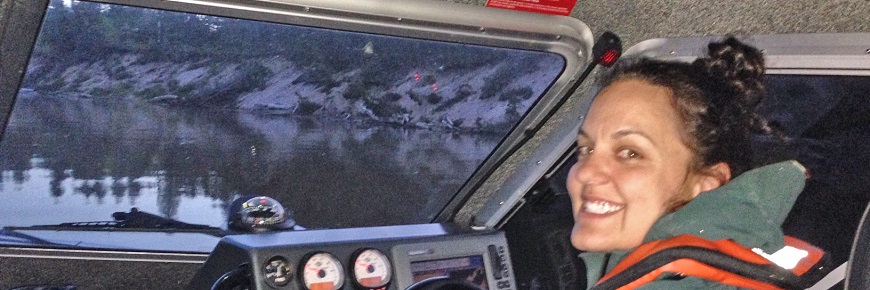
Vessel operation for science monitoring and visitor safety
Lake Superior National Marine Conservation Area
by Jenna MacLaurin
From a young age, I knew there was something profoundly different about Lake Superior. I was warned this vast, frigid lake that surrounds my community of Fort William First Nation requires respect and care. Although I knew any body of water has the potential to be dangerous, it was my work as a primary vessel operator with Parks Canada that taught me what preparedness means.
Watching documentaries that profiled marine biology inspired my education in Marine Environmental Technology. I felt compelled to pursue a career in natural resource conservation. I wanted to assist in the rehabilitation of natural environments and create awareness around resource exploitation. This path led me into fisheries management with First Nation communities belonging to the Anishinabek Nation, where I learned basic commercial vessel operations and met the Ecologist from Pukaskwa National Park, who encouraged me to apply for a job with Parks Canada.
I began working at Pukaskwa in resource management utilizing a well-developed monitoring program. While employed there, I met the Manager of Resource Conservation at the Lake Superior National Marine Conservation Area (NMCA), where I currently work. As part of the resource conservation team, I assist in the development of resource monitoring objectives for the marine conservation area. Pukaskwa National Park and Lake Superior NMCA, both managed by Parks Canada, protect and present heritage values on or adjacent to Lake Superior.
Visitors often ask: “how do you get a job like yours?” Vessel Operators in the Northern Ontario Field Unit are required to hold the following valid certificates: Restricted Operators Certificate – Maritime; Small Craft Operators Basic; Marine Emergency Duties A3, and First Aid/CPR. When these courses are complete, an operator will receive mentoring with an experienced local operator. This combination teaches skills of commercial vessel operation with the use of radar, large wave navigation, and tactical maneuvering.
I knew I would use vessels for scientific data collection, but I did not fully comprehend what it meant to apply my vessel operation skills to the visitor safety program. Parks Canada occasionally supports the Coast Guard with emergency response. It was hard coming to terms with the idea of people succumbing to environmental conditions while visiting a protected area. However, this is a reality associated with an environment as vast as Lake Superior. Preparedness is hinged on nature and the unknown. The ‘unknown’ is what propels the resource conservation and visitor safety team to continually evolve. We strive to learn and mitigate for the ‘unknown’, so this reality becomes manageable.
My childhood dream of working in natural resource conservation has come true. I am fulfilled in a position which helps protect and present the biological attributes of Lake Superior, and creates safe and enjoyable opportunities for visitors while visiting Lake Superior’s natural heritage!
Back to shoreLINES
- Date modified :